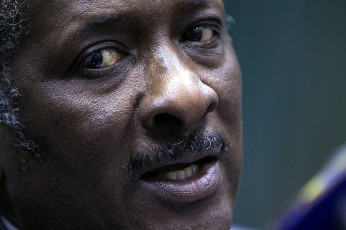Sudan determined to remove fuel subsidies despite oil agreement with south
April 4, 2013 (KHARTOUM) – Sudan’s finance and national economy minister Ali Mahmood Abdel-Rasool said today that his government will continue its belt tightening policies despite securing an agreement with South Sudan on oil exports that is expected to generate around $2 billion annually.

South Sudan’s first oil shipment is expected to leave Port Sudan next month, officials in Khartoum have said.
The accord is expected to breathe new life into the beleaguered economies of the two countries which were heavily dependent on oil remittances to pay for imports of basic commodities.
Following the independence of South Sudan in July 2011, Khartoum was forced to introduce a contractionary budget that saw the partial lifting of fuel and food subsidies which triggered rare but small demonstrations across the country.
The government defended the measures saying that the country can no longer afford to pay for these subsidies after losing 75% of the oil reserves that are now in South Sudan territory.
Sudan’s finance minister affirmed that the government will continue cutting fuel subsidies in an interview with Reuters today.
“Maybe every month we can remove a little bit, half a pound or a pound,” Abdel-Rasool said adding that the subsidies – which make up around 12 percent of state spending – should be fully removed by mid-2015.
He said that in 2013 Sudan will receive a reduced amount of proceeds from South Sudan’s oil transit fees since the oil flow started late into the year.
“I do not know when the full oil flow will [resume]. The shutdown affected the wells … so at the start it will be less than what is expected” the finance minister said.
“It could be half, $1 billion, something like that,” he added from Dubai, where he attended Tuesday’s meeting of Arab finance ministers and central bank governors.
He also disclosed that Khartoum was looking into introducing new taxes on gold.
“We are trying to find a way to impose a tax like VAT [value-added tax] that will increase our revenue. It’s a technical issue but we need that because it is huge money” Abdel-Rasool said.
“This [gold] is produced by the people. They are now getting rich, building houses, they have vehicles, they have everything and it is quite difficult to find a way of taxing them” he added.
Currently, budget receipts from gold are very small, Mahmoud said, as they come from a 15 percent business profit tax paid from traders’ commissions. Gold producers pay a 7 percent royalty.
This week Sudanese president Omer Hassan al-Bashir revealed that the country’s gold exports in 2012 reached $2.2 billion and that more foreign companies are conducting gold exploration efforts across the country.
The International Monetary Fund (IMF) projected last year that its fiscal gap would narrow to 3.2 percent of GDP in 2013 from an estimated 3.7 percent last year. Sudan’s GDP was projected to shrink 0.6 percent in 2013 after an 11.1 percent drop in 2012.
But the finance minister disputed the figures insisting that the GDP actually grew last year, by 1.4 percent, and he predicted 3.6 percent growth in 2013.
“The driver will be the agriculture sector because we had a good rain season this year” he stressed.
(ST)
